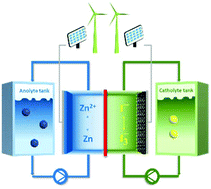MoS2-modified graphite felt as a high performance electrode material for zinc–polyiodide redox flow batteries†
Abstract
Zinc–polyiodide redox flow battery (RFB) systems with highly soluble triiodide/iodide (I3−/I−) couples have demonstrated significantly enhanced energy densities. However, their low power density has limited their broad application. In this work, MoS2 nanoplates were in situ grafted onto graphite felt (GF) surfaces to accelerate the I3−/I− redox reaction. The hexagonal phase MoS2 with enlarged interlayer spacing can facilitate the diffusion of the electrolyte, and the defects on the MoS2 nanoplates can serve as very effective catalytic active sites. Cyclic voltammetry testing revealed the high catalytic performance of MoS2 in the I3−/I− redox reaction. A non-flow cell with the MoS2-modified GF serving as a positive electrode showed a higher energy efficiency than that of pristine GF; increases of about 10.2% and 10.9% at current densities of 30 mA cm−2 and 40 mA cm−2 were obtained with the optimized electrode, respectively.

- This article is part of the themed collection: 2019 Inorganic Chemistry Frontiers HOT articles


 Please wait while we load your content...
Please wait while we load your content...